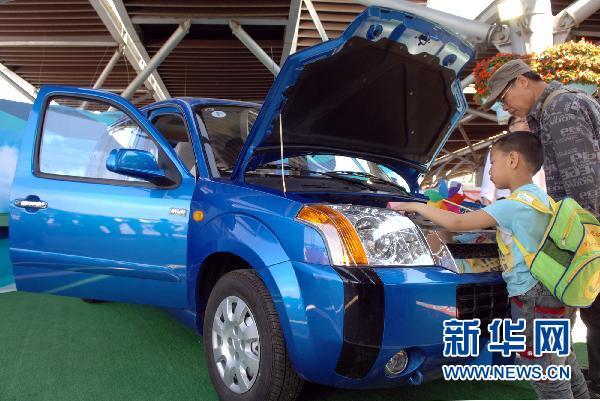E-car buyers to 'skip license-plate draw'
Beijingers who buy electric cars, or e-cars, could avoid having to take part in the license plate lottery, a spokesman for a Chinese automaker said on Sunday.
 |
|
People visit the electric cars at the 17th Beijing Science and Technology Week on May 15, 2011. Beijingers who buy electric cars could avoid having to take part in the license plate lottery. |
The central government has already announced plans to introduce subsidies to encourage drivers to switch to clean energy models, which will likely be boosted by municipal authorities.
However, during a display at the Olympic Green as part of the 17th Beijing Science and Technology Week, Zhang Yuzhao of Beijing Automotive (BAIC) said e-car buyers will not have to rely on luck to get a registration.
"People with Beijing hukou (permanent residency) will not have to enter the (license) lottery," he told METRO while promoting his company's electric-powered Foton Midi.
"Owners of 100-percent e-cars are not subject to the (monthly) restriction policy."
METRO was unable to confirm the information with the city's transport bureau before going to press.
At 300,000 yuan ($46,170), the Foton Midi is more than twice the price of the gasoline-powered model, although Zhang argued: "With the subsidies, consumers will pay only 180,000 yuan. After running for 90,000 km, the owner saves so much money that it's like the car is free."
His calculation is based on the fact electricity is currently priced at 0.76 per kilowatt. However, other costs include regularly replacing the battery.
"I think the car is a little expensive," said Lu Xiaowei, a 26-year-old securities analyst who was browsing BAIC's booth. "Anyway, electric vehicles are the future of city transport."
Gao Mei, a 35-year-old senior high school teacher, added: "It's a bargain with governmental subsidies and the easy access to license plates, but I still have concerns of whether the related infrastructure (charging stations) will be put in place soon. Until that has happened, I won't buy one."
BYD, another Chinese car company, plans to launch its E6 model in the capital in July, with prices starting at 300,000 yuan, according to a service worker at its Pengtian'ao branch.
"The company is still waiting on polices concerning governmental subsidies before sales," said Li, who gave only his surname. "Lots of people are calling every day, asking about prices and functions of the E6. As long as the restriction on gasoline car purchase exists, the car will definitely sell well."
Beijing is now building its first batch of three battery swap stations and 16 charging stations, which are slated for completion this year, China Automotive Review reported.
It is also applying to become the sixth pilot city to subsidize buyers of new energy vehicles, following in the steps of Shenzhen, Changchun, Hangzhou, Hefei and Hangzhou.
 0
0 






